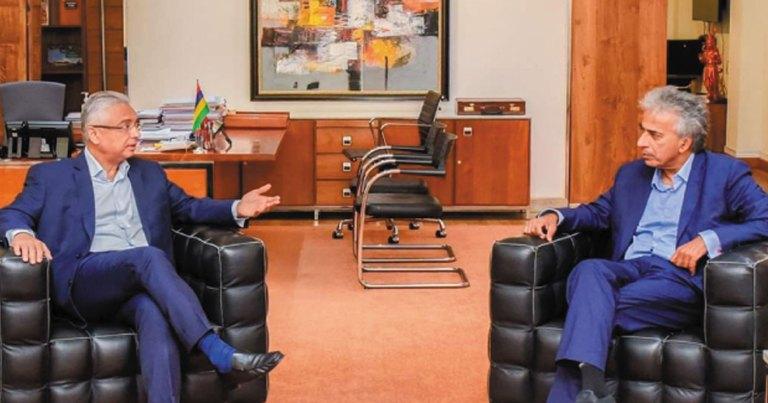Africa-Press – Mauritius. The management of the coronavirus pandemic in all affected countries, including Mauritius, posed fundamental health, economic and democratic challenges.
Now that these countries are considering a gradual deconfinement towards a return to normalcy, debates will continue on the correctness of the measures taken to limit the damage, on the shortcomings of the systems in place, on the potential reforms and the future of post-crisis society.
pandemic. Maurice will not escape this reflection. It will have to draw the relevant lessons, assess the effectiveness of its public policies and consider new socio-economic orientations.
Public health In terms of health, it is clear that Mauritius has fared fairly well compared to other countries which have been severely affected (Italy, United Kingdom, France), proportionately.
Despite the indiscipline of some Mauritians, things got back to normal thanks to the curfew. There were hiccups, hiccups, and signs of unpreparedness for the crisis, but – overall – there was no system breakdown or spillover.
Containment imposed to stem the spread of the virus has worked given the number of human casualties. It is probably too early to claim victory because the risk of a second wave of contamination still exists.
Vigilance remains essential. One cannot deny the importance of a public health system, adequately financed and equipped with human and infrastructural resources, free from any temptation to privatize for the sole reason of profit.
Public health is part of the welfare state, whose funding will be strained with the reduced fiscal capacity of the state. However, we must stay the course by deciding on the choices of public investment and having a clear vision of the priorities.
Economic recovery All governments face the same dilemma: allow a gradual resumption of activities or continue with the lockdown for another two weeks until the curve of the epidemic is flattened.
This is a difficult choice to make (trade-off) if we want to avoid a resurgence of the virus while allowing gradual deconfinement by phases and by business sector.
Public health scientists and economically conscious politicians are at opposite ends of the spectrum. It will ultimately be up to the Government to decide on the stages of recovery with full knowledge of both health and economic risks.
Economic recovery is vital in this race against time to mitigate the collateral damage suffered by employees and businesses, but the decisions of the Government will be decisive with regard to future directions.
Financial aid plans for temporarily unemployed employees and the self-employed have been crucial in the effort to avert a human catastrophe. As for the business support plan, it is essential that the Government does not sign them a blank check.
Unlike the business rescue plan implemented in 2008, the Government must add strings to public aid. That companies not be allowed to pocket public money while making layoffs.
Whether the public aid is a loan repayable over time or a State equity investment in companies, even if the shares acquired are subsequently sold to them.
That companies suspend the payment of dividends until the financial results are positive, as some voices are calling for in India and France. More than ever public generosity without compensation is not acceptable.
Democratic functioning At the same time as the Government takes emergency measures by availing itself of emergency powers, democracy must be prevented from becoming another collateral damage to the crisis.
Certain authoritarian abuses such as police brutality against a family or the temporary suspension of free radio are deplorable. Fortunately, the Supreme Court acts as a bulwark against arbitrariness.
In times of crisis, the right to free and objective information is essential, as is evidence-based analysis. Unlike countries with authoritarian political systems (China, Turkey, among others), citizens in liberal democracies value their civil liberties.
They want a government that is accountable and transparent and that can account for the public money spent under the various aid plans. This is where the parliamentary opposition must be able to play its role of watchdog and credible interlocutor in questioning the Government and making proposals. Lockdown should not be used as a pretext for hibernating Parliament.
In some countries (Great Britain, Canada, for example), Parliament already operates with a reduced staff (parties reduce the presence of elected representatives to a minimum quorum in proportion to their representation) or in virtual mode (parliamentary committees by videoconference ) to pass emergency laws.
The majority and the minority will never be on the same wavelength, but they can agree on how to end the crisis. The consensual approach is not the strength of representative democracy, which is a system based on adversarial debate.
The government and the opposition may not agree on basic directions for the future, but they can agree on how to resume activities so that everyone can return to their usual occupations.
In this regard, the consultations between the Prime Minister and the Leader of the Opposition are salutary from the point of view of the political truce. Fortunately, the call for a national unity government has fallen on deaf ears. Fundamental issues
This crisis has highlighted fundamental issues related to the economic system, the social protection system, education and citizenship, social housing, civil liberties and the exercise of emergency powers.
It exposed glaring class inequalities such as the economic precariousness of vulnerable groups and the lack of access to online services. Some families may shop online or watch movies on Netflix, while children from poor families do not have Internet access for online lessons.
Some families living in slums cannot apply for social assistance without ad hoc support. No matter how economists predict an economic recovery in a V shape (meaning rapid growth) or a U shape (subsidence followed by rapid growth), the market economy without radical transformation will remain subject to endogenous and exogenous shocks in the future.
It is a whole new reflection on the model of society which is essential with a particular emphasis on the redistribution of wealth, local production and renewable energies, distribution systems (sale / resale with intermediaries), the efficiency of public sector, public service reform, economic empowerment of vulnerable people, fair taxation, climate change, and access to education and employment.
For More News And Analysis About Mauritius Follow Africa-Press







